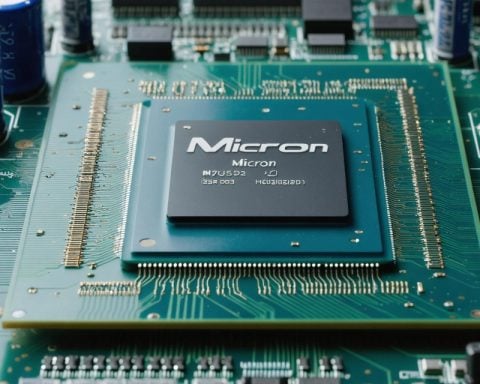- Apple partners with Alibaba to revolutionize AI in China, advancing its global AI strategy.
- Strategic timing targets 100 million upgrade-ready iPhones in China for AI integration.
- Upcoming iPhone 16 and 17 models to enhance user interaction with advanced AI capabilities.
- Projection: 25% of the global population may use AI through Apple devices, fostering global connectivity.
- The partnership with Apple and Baidu boosts AI innovation, potentially increasing smartphone sales and new revenue streams.
- AI-enhanced apps are set to transform user experiences and drive a significant upgrade cycle.
- This collaboration positions Apple as a leader in AI, reshaping the tech industry’s future landscape.
Apple and Alibaba have joined forces to reshape the landscape of artificial intelligence in China, marking a bold step forward in Apple’s global AI strategy. Partnering with giants like Baidu sets the stage for a transformative leap, as Apple prepares to introduce its AI services by early May. With China hosting a staggering 100 million iPhones ripe for upgrades, the timing couldn’t be more strategic.
Visualize the impact: the sleek, innovative iPhone 16 and future iterations like the iPhone 17 will redefine how consumers interact with technology. These devices are equipped to tap into cutting-edge AI applications, signaling a new era in smartphone evolution. Analysts predict that in the not-so-distant future, a quarter of the global population will harness the power of AI through Apple devices, shaping a connected world in profound ways.
This alliance provides Apple with a unique platform to innovate and expand its AI-driven ecosystem. By integrating Apple Intelligence with its devices, the company is not only boosting smartphone sales but also unlocking potential new revenue streams. Picture a world where apps are evolved with AI, transforming user experience and fostering an unprecedented upgrade cycle among devoted consumers.
As the digital horizon continues to expand, this partnership positions Apple as a trailblazer in AI, potentially outpacing competitors and redefining the tech industry’s future landscape. With this collaboration, Apple is not merely playing the AI game; it is reshaping its very rules, ensuring its place at the forefront of innovation for years to come.
Apple and Alibaba’s AI Revolution: What You Need to Know
The Revolutionary Apple-Alibaba AI Partnership
Apple’s alliance with Alibaba in China is not just a strategic business move; it’s a significant step toward revolutionizing artificial intelligence (AI) within the technology industry, particularly in the Chinese market. This partnership is expected to bring Apple to the forefront of AI development, opening doorways for enhanced user experiences, economic opportunities, and new industry standards.
Real-World Use Cases
The integration of AI into Apple’s ecosystem, backed by Alibaba’s robustness, offers several practical applications:
1. Enhanced User Experience: Future iPhones, like the iPhone 16 and iPhone 17, will feature advanced AI capabilities for smoother, more intuitive interactions. This includes personalized recommendations, smarter Siri capabilities, and robust augmented reality (AR) features.
2. Health and Fitness Innovations: Leveraging AI for health monitoring and fitness tracking could lead to more personalized health insights and preventive strategies, enhancing the functionality of Apple Watch and related services.
3. Business Optimization: Businesses could experience transformations through AI tools enhancing productivity, customer engagement, and data analytics.
Market Forecast & Industry Trends
The global AI market is experiencing accelerated growth, projected to reach $190 billion by 2025, according to MarketsandMarkets. Apple’s strategic position with Alibaba in China places it advantageously to capture a significant share of this growing market:
– AI-Powered Smart Devices: As AI adoption increases, Apple’s AI-driven devices are expected to rise dramatically, capitalizing on growing consumer demand and loyalty.
– Emerging Technologies and Services: With AI, there’s potential for developing more advanced technologies such as autonomous systems and sophisticated voice assistants.
Reviews & Comparisons
When comparing Apple’s strategic AI move to competitors like Google and Amazon, Apple’s methodology focuses on seamless hardware-software integration. While Google’s AI approach heavily leans on its search and data analytics strengths and Amazon maximizes AI for e-commerce and voice-activated devices, Apple’s strategy emphasizes creating an unmatched user ecosystem driven by AI.
Controversies & Limitations
Despite the promise of innovation, such partnerships are not without challenges. Concerns about privacy, data security, and regulatory compliance are significant obstacles Apple and Alibaba must navigate, especially given the Chinese government’s strict data regulations.
Security & Sustainability
Apple remains committed to stringent privacy and data protection standards, incorporating robust security features to ensure user data is securely processed within AI applications. Additionally, Apple’s commitment to sustainability drives its AI developments, focusing on energy-efficient technologies and reducing carbon footprints.
Insights & Predictions
With Apple’s aggressive AI pursuit, analysts project rapid innovations in the consumer tech market. Expect a surge in AI-driven applications simplifying daily tasks, alongside improved interactive technologies enhancing user engagement.
Actionable Recommendations
– Upgrade Devices: For the most seamless AI experiences, consider upgrading to newer Apple devices, such as the forthcoming iPhone iterations.
– Leverage AI Applications: Explore and regularly update current Apple applications to take full advantage of AI-enhanced features.
– Stay Informed: Keep abreast of the latest developments in AI technology through credible sources to leverage these advancements effectively.
This partnership between Apple and Alibaba underscores the transformative potential AI holds not only within the consumer tech industry but across multiple domains globally. As these two giants collaborate, the digital future becomes not just something observers witness but actively participate in shaping.






















